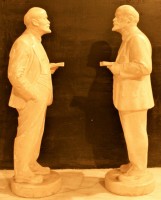
Dialectic Lenins. Photo courtesy Kristen Ghodsee
This marks the beginning of the Soyuz Network for Postsocialist Cultural Studies? online Anthropology News column.? Soyuz is an interest group of the American Anthropological Association (AAA) and an officially recognized unit in the Association for Slavic, East European and Eurasian Studies (ASEEES), formerly the American Association for the Advancement of Slavic Studies (AAASS).? Soyuz is a loose scholarly association of researchers interested in cultural studies, and although many of us are anthropologists and ethnographers, the Soyuz membership is interdisciplinary and includes historians, political scientists, sociologists, philologists as well as those in literary, film and media studies.? Traditionally, the network has provided a platform for those doing rich qualitative research informed by fieldwork in postsocialist countries.
The primary activity of the network has been a yearly symposium, which brings scholars together to share current research at a host university in the US.? Soyuz symposiums are unique in that they showcase the work of graduate students and international scholars in an intimate setting where there is only one panel at a time.? In 2013, the Harriman Institute at Columbia University is hosting this symposium.
The Soyuz Network is an heir of the old East European Anthropology Group of the AAA.? Originally, most Soyuz members did their research in the Central and East European and Central Asian countries emerging from state socialism between 1989 and 1991 (hence its ongoing affiliation with the Slavic Studies association). Over the years, however, there has been a concerted effort to expand the critical purchase of the term ?postsocialist? to include countries that experimented with a socialist path to development during the Cold War (eg, Nicaragua, Vietnam, Zambia, Ethiopia, Angola, Tanzania, and so forth) as well as those nations that are nominally still socialist in some form (eg, Cuba, China, North Korea).? The philosopher Nancy Fraser uses ?postsocialist? to refer to the politics of all states (including the US and those in Western Europe) after the demise of the Eastern Bloc.
Because of these ambiguities, the term ?postsocialist? is contested. ?Scholars from Central and Eastern Europe are often uneasy about labels that include the words ?socialist? or ?communist? more than two decades after the so-called democratic revolutions of 1989.? ?How long beyond the demise of an ?-ism? should it be saddled with the prefix ?post?? ?Another problem is whether the term is just a temporal marker versus being a critical, theoretical tool.? In the former case, a study of pickle making in contemporary Bulgaria might fall under the rubric of postsocialist studies merely because the activity is happening in the country after 1989.? In the latter case, the pickle making research would only be considered postsocialist cultural studies if the study engaged critically with the political economy of pickle making in Bulgaria from the state socialist era, through the process of privatization in the 1990s, and within the neoliberal climate of the present day.? For many scholars, the term ?postsocialist? is only useful if it is part of an intellectual project that historicizes the lived experience of 21st century global capitalism.
In a groundbreaking 2009 article in ?Comparative Studies in Society and History?, Sharad Chari and Katherine Verdery investigate the genealogy and continued salience of the terms ?postcolonialism? and ?postsocialism.?? They argue that: ?It is time to liberate the Cold War from the ghetto of Soviet area studies and postcolonial thought from the ghetto of Third World and colonial studies.?? Chari and Verdery call on scholars to get rid of the terms ?postsocialism? and ?postcolonialism,? and replace them with one unified term: ?post Cold-War.??? This idea of ?post-Cold War? studies would encompass all geographic areas and might be defined by a particular methodological or critical approach to the legacies of the demise of the Second World.
At our last business meeting in San Francisco, Soyuz members expressed a host of anxieties around the continued use of the term ?postsocialist? in our name. ?There were others in attendance, however, that argued that there was some continuity and similarity in the experiences of countries that experimented with various forms of state socialism during the 20th century.? In a keynote address at the Soyuz Symposium at Princeton University in 2007, Stephen Kotkin argued that there is a material reality that still unites the former communist countries: from the architecture of the apartment blocks, to the socialist realism of the monuments, to the appliances still working in people?s homes.? For those who feel that there is something uniquely ?postsocialist? to the term ?postsocialism,? Soyuz does provide an important home for those doing research in these particular parts of the world (scholars who feel lost or marginalized within ?European Studies? or ?Asian Studies?).? Whether you embrace or reject the word ?postsocialist,? the Soyuz network is a key venue for these ongoing debates.
The goal of this new Soyuz column for Anthropology News is to share with other anthropologists around the world the vibrant intellectual work being done in ?postsocialist cultural studies,? however broadly defined.? The column welcomes contributions from both Soyuz members and from scholars whose work will be of specific interest to our membership.?? Through ongoing dialogue and exchange, the Soyuz Network for Postsocialist Cultural Studies will continue to foster a community of researchers whose work examines the histories, ideologies and lived experiences of perhaps the only fully realized (though far from perfect) political and economic alternative to neoliberal capitalism.
Kristen Ghodsee is contributing editor of the Soyuz column in Anthropology News.
jon corzine austin rivers austin rivers sweet home alabama etch a sketch the host hoodie
No comments:
Post a Comment